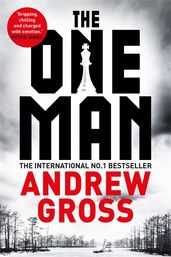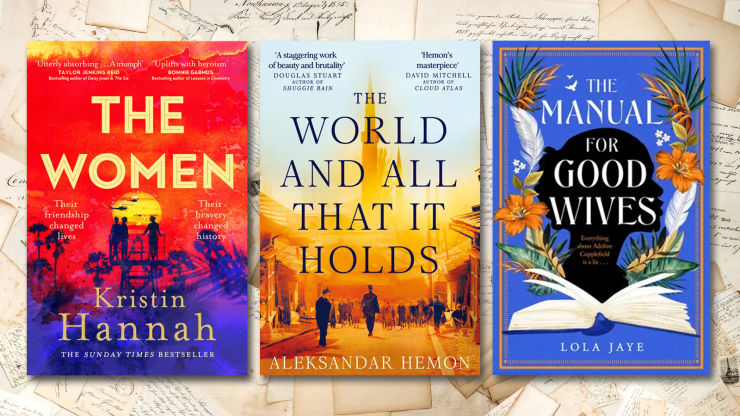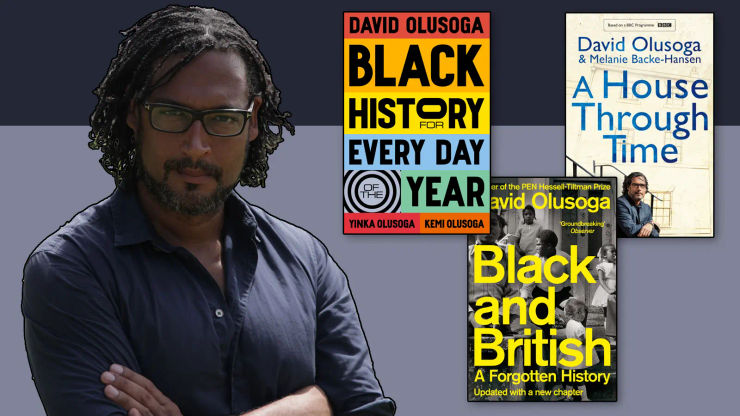True stories of wartime bravery that inspired The One Man
Bestselling author, Andrew Gross, on the true stories of bravery, sacrifice and scientific discovery that inspired his World War Two thriller, The One Man.

Bestselling author, Andrew Gross, on the true stories of bravery, sacrifice and scientific discovery that inspired his World War Two thriller, The One Man.
'If he was able to tell his own story, the whole tale, I always imagined it would read something like this.'
My father-in-law, Nathan Zorman, was raised in Warsaw, Poland, and, in a shift of fate that no doubt saved his life, he left in early 1939 to come to the United States, just months before the war. He never heard from anyone in his family again. In 1941, when America entered the war, he enlisted in the U.S. Army and, because of his knowledge of languages, was placed in the Intelligence Corps.
Sadly, he died months before this novel's publication, at ninety-six, but like many survivors, never spoke a word about his experiences either during the war or while he was growing up in Poland. Bringing to mind the faces of the family he never saw again was simply too painful. Over the years, he never even made an attempt to find out his family's fate. I always wanted to find a way to put his anguish in a book—the grief and the loss—the guilt at having survived, which, I thought, in spite of many blessings in his life, had left him detached from inner happiness for seventy-plus years.
Much of The One Man is based on truth. Alfred Wetzler and Rudolf Vrba were indeed real, and their depiction of Auschwitz after their remarkable escape was circulated in the highest channels of the U.S. government and brought the horrors there out of the darkness. The meetings with President Roosevelt and his war cabinet on this very subject were based on truth, as his war chiefs reviewed several proposed plans to stop the genocide, such as raids on the camps or bombing the railway tracks leading into them, but ultimately rejected them all. The compelling saga of the Vittel Jews with their forged Latin American identity papers is true as well, as was their fate—after being betrayed by a Jew from the Warsaw ghetto, they were all shipped to Auschwitz in January 1944, all 240 of them, and never heard from again.
While looking into my father-in-law's past, I came across the massacres that took place in Lvov, Poland (now part of Ukraine), in June–July 1941 under the German occupation. At the time Lvov had a thriving university and the third-largest Jewish population in Poland. In what was termed an act of 'self-purification,' the university there was brutally purged by both Nazis and Ukrainians, and thousands of Jewish intellectuals—professors, scientists, and artists—were rounded up and either shot on the spot or sent off to the death camps of Treblinka, Sobibor, and Auschwitz. From there, it wasn't too much of a leap for a novelist to ask: What if one of these esteemed thinkers carried some kind of vital knowledge that could change the outcome of the war or, even beyond that, the course of human thought? Something that needed to get out, or would, like a buried secret, die along with him.
It was with this idea in mind that I came across the figure of prominent Danish physicist Niels Bohr. Considered one of the founders of atomic theory, Bohr was awarded the Nobel Prize for Physics in 1922 and was among the most revered scientific figures of his time. In the book I describe his harrowing escape from Denmark literally a day before he was to be arrested and likely sent off to a death camp, and his even more harrowing voyage to London strapped into the bomb bay of a British Mosquito. A year later he was a member of the British mission to the Manhattan Project in Los Alamos. In addition to being a father figure to many of the other physicists there, as late as 1945 Robert Oppenheimer credited Bohr with making an important contribution to the modulated neutron initiators that were crucial to the bomb's triggering device. Bohr's vast knowledge never assisted the Nazis, but it was not too much of a stretch to imagine how, had Bohr been sent to the camps or even forced to succumb and aid the German war effort, the course of the war might have been decidedly altered or, at the very least, the outcome delayed.
Sadly, Alfred Mendl is not a real figure (and his mention in Los Alamos is fictional too). But the science in my book—the gaseous diffusion process, whereby highly enriched uranium-235 is separated from its more common and non-fissile cousin, U-238—did become the most efficient separation method for the first atomic bombs. It was also not a European physicist who was at the forefront of this process in 1943 and 1944 but scientists from the University of Minnesota and the University of California at Berkeley. For that research I am highly indebted to several books (listed in the bibliography below), but principally Richard Rhodes's compelling and monumental study, The Making of the Atomic Bomb.
It was also very helpful to speak with Robert Kupp, a chemical engineer who actually worked on the Manhattan Project in Oak Ridge. While researching this book, I also came across the real-life story of Denis Avey, a British soldier captured in North Africa and sent to a POW camp in Poland, who actually snuck inside Auschwitz for a night and then back out to tell a firsthand account of the horrors there. His remarkable story can be read in his memoir: The Man Who Broke into Auschwitz.
So it was not such a leap to imagine that Nathan actually could have gotten in and out. I've tried to remain as true as possible to the actual history around the events described in this book. (Filip Müller's testament, Eyewitness Auschwitz, Ivan R. Dee, was one of several indispensable firsthand accounts.) Never for a second did I think of writing the definitive book on Auschwitz—the atrocities there have already been ably recorded on far more graphic and personal levels than mine. Still, the subject matter is sacrosanct, and as a Jew, I respect that history as much as anyone. But I did take what I hope will be seen as a few small liberties with the actual truth in the following areas: One is that after 1942, the women's camp was situated at Auschwitz's sister camp, Birkenau, a mile and a half to the northeast. And although my story takes place in 1944, the train tracks leading through the gates of Birkenau were already completed by then. Other than that, I tried to remain as accurate as possible in my retelling of the place and the acts there. Several people recounted personal stories of their experiences that are included in the narrative, which helped me enormously.
As I said, once the United States entered the war, my father-in-law enlisted in the Army and, because of his facility with languages, was placed in the Intelligence Corps. As with his upbringing in Poland, whatever it was he did in the service has never been spoken of to any in his family. The One Man is my story, not his. But if I could somehow have pushed through his pained and brooding expressions when urged to speak about his past; through his inability to articulate the long-held-in burdens of guilt and loss; if he was able to tell his own story, the whole tale, of his past in Poland and the role he played during the war, I always imagined it would read something like this.
The true stories that inspired The One Man
FDR and the Jews by Richard Breitman and Allan J. Lichtman
A contentious debate still lingers over whether Franklin Delano Roosevelt turned his back on the Jews of Europe. In an extensive examination of this impassioned debate, Richard Breitman and Allan J. Lichtman offer an intriguing portrait of a consummate politician, compassionate but also pragmatic, struggling with opposing priorities under perilous conditions.
American Prometheus: The Triumph and Tragedy of J. Robert Oppenheimer by Kai Bird and Martin J.
Sherwin
A meticulous and riveting biography of J. Robert Oppenheimer – director of the Manhattan Project that developed the atomic bomb and the most famous scientist of his generation.
The Adventures of a Mathematician by S. M. Ulam
The autobiography of mathematician Stanislaw Ulam, one of the great scientific minds of the twentieth century. He was among the first to use and advocate computers for scientific research, originated ideas for the nuclear propulsion of space vehicles, and his work was integral to the development of the hydrogen bomb.
The Making of the Atomic Bomb by Richard Rhodes
The complete story of how the bomb was developed, from the turn-of-the-century discovery of the vast energy locked inside the atom to the dropping of the first bombs on Japan. Few great discoveries have evolved so swiftly, from the theoretical discussions of nuclear energy to the bright glare of Trinity there was a span of hardly more than twenty-five years.
Eyewitness Auschwitz by Filip Müller
A firsthand account of three years in the gas chambers and one of the key documents of the Holocaust. This work offers a shattering account of an Auschwitz prisoner who worked in the gassing installations and crematoria and lived to tell the tale.
Discover more of the most important Holocaust books to enrich your understanding of the horrific events.
The Man Who Broke into Auschwitz by Denis Avey with Rob Broomby
The extraordinary true story of a British soldier who marched willingly into Buna-Monowitz, the concentration camp known as Auschwitz III. In the summer of 1944, Denis Avey was being held in a POW labour camp, E715, near Auschwitz III. He had heard of the brutality meted out to the prisoners there so, determined to witness what he could, he hatched a plan to swap places with a Jewish inmate.
Andrew Gross' gripping story of heroism and revenge, The One Man is out now.
The One Man
by Andrew Gross
'An overwhelming, immersive, suspenseful success.' - Lee Child
Auschwitz, 1944. Alfred Mendl's days are numbered. But he has little left to live for – his family were torn away from him, his life's work burned in front of his eyes – until a glimmer of hope arises as he watches a game of chess. To the guards Mendl is just another prisoner, but in fact he holds knowledge that only two people in the world possess. The other is working hard for the Nazi war machine.
Four thousand miles away, in Washington DC, intelligence lieutenant Nathan Blum decodes messages from occupied Poland. After the Nazis murdered his family, Nathan escaped the Krakow ghetto and is determined to support his new country – and the US government knows exactly how he can. They want to send Nathan on a mission to rescue one man from a place no one can break in to – or out of.
Even if Nathan does make it in and finds him, can they escape the most heavily guarded place on earth?
The One Man is a thrilling tale of heroism from master of the genre, Andrew Gross.



